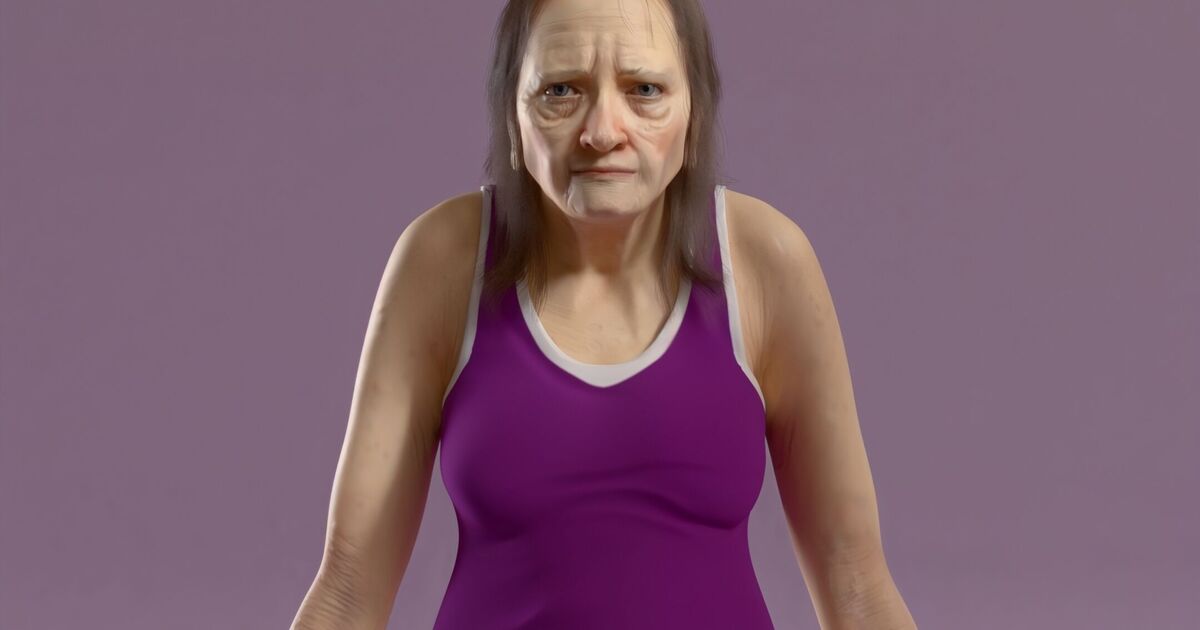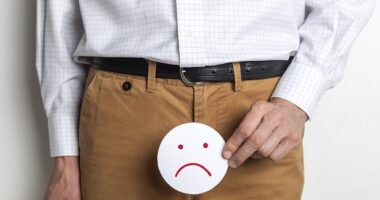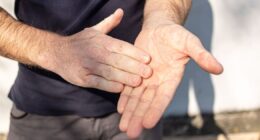The UK is in the middle of a tiredness epidemic, with the average Brit getting up to only 6 hours and 24 minutes of sleep per night.
But what can this epidemic have to do with our health and physical appearance?
Sleep expert Dr Sophie Bostock alongside Bensons for Beds have predicted what our bodies will look like by 2050 – and it’s not pretty.
In an effort to encourage such changes and raise awareness around the importance of making time for some quality sleep, a new model shows a hunched, wrinkled woman with hair loss.
Meet Hannah – A life-like 3D render based on scientific research, factoring the physical impacts that lack of sleep can have on the human body – including hair, muscles, skin, eyes, brain function and the immune system.
“Research into the importance of consistent, good quality sleep for our health and wellbeing has accelerated in the last few decades. Many of us don’t realise that haphazard daily routines and lack of sleep interfere with our circadian rhythms, the 24-hour cycles which control our physiology,” says Dr Bostock.
Your circadian rhythm is your body’s internal clock that regulates your sleep-wake cycle, including other bodily functions over a 24 hour period.
The evidence used to create Hannah was collected from published research papers in academic journals dating from 2010. Using this information animators and artists created Hannah – a visual representation of Britain’s sleep deficit dilemma.
Dr Bostock says: “Hannah is a thought-provoking illustration of the holistic impact that sleep has on maintaining overall health. Studies show that prolonged sleep deficiency can put you at a higher risk for conditions that may impact the heart – including obesity, heart disease and Type 2 diabetes.”
When looking at Hannah’s appearance, there are many factors that contribute to her unsettling appearance, so here is a brief summary from head to toe (literally):
- Memory loss – During sleep, your brian forms important connections that help you process and remember new information. Hannah’s lack of sleep has negatively affected both her long and short term memory.
- Hair- Due to poor sleep patterns, Hannah had developed alopecia.
- Eyes and mouth – Fine lines, red eyelids, bags under her eyes, and droopy corners around her mouth
- Nose – Sleep deprivation has made Hannah susceptible to respiratory infections like the common cold and flu
- Skin – Reduction in her skin’s elasticity, dramatically increasing signs of aging. Lack of sleep has also given her multiple skin problems such as jaundice and wrinkles.
- Chronic back and shoulder pain – Her sleep deprivation has increased her sensitivity to pain and amplified sporadic pain symptoms such as back and shoulder pain.
- Stomach – Restricted sleep has disturbed both her leptin and ghrelin hormones, which control our feelings of hunger and fullness. Without enough sleep, your brain reduces leptin and raises ghrelin, which is an appetite stimulant. The flux of these hormones could explain nighttime snacking or why someone may overeat later in the night.
- Muscle atrophy – This is where your arms and legs shrink in size and shape in response to living on empty day in and day out
- Swollen legs – Prolonged sleep deficiency has given Hannah heart disease, prematurely affecting her life expectancy – one of the signs of which is swollen ankles
It’s easy to feel overwhelmed after reading this information, but Lisa Richards, Marketing Director at Bensons, reminds us that, “Hannah is a worst-case scenario prediction of what could happen to somebody if they do everything badly in terms of poor sleep routine and poor mattress support. Of course, she doesn’t represent all Brits, but the reason we wanted to create this model was to make people think more carefully about their overall sleep experience. Using this visual makes it easier for people to identify with the issue and the key signs.”
Luckily for you, these are some handy tips to avoid becoming like Hannah:
- Reset your circadian rhythm by getting out of bed around the same time every morning, including weekends.
- Try to be as physically active as possible. The government recommends 75 minutes of strenuous or 150 minutes of moderate physical activity per week, plus 2 balance sessions, and 2 strength building sessions to maintain good health
- Make sure to absorb natural light during daytime hours, whether that be taking outdoor breaks whenever possible or working by a window for example. In the evenings, be sure to turn down bright overhead lights two hours before bed, keeping your room as dark as possible.
- As for your gadgets, the blue light from your screens tricks your brain into thinking it is daytime, stopping your body from releasing melatonin, the sleep hormone. Turning screams off 30 minutes before you sleep is very important.
- Eating late can disrupt the quality of your sleep so along with the lights, be sure to eat your dinner two hours before you sleep.
Obviously, not everyone is a quick fix and those suffering with insomnia could be hardest hit by sleep deprivation.
If you are one of these individuals you can seek advice from Dr Bostock on the Bensons for Beds Sleep Hub.
However the recommended treatment for insomnia includes, seeking out a medical professional for advice.
You can also contact your GP who may be able to give you advice about healthy sleep habits or rule out other conditions which could be affecting your sleep.
Another recommended course of treatment is by a talking therapy approach called Cognitive Behavioural Therapy for Insomnia (CBT for Insomnia).










